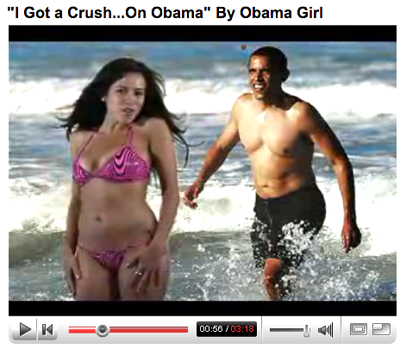 What impact will “I Got a Crush on Obama” — the semi-salacious, MTV-style video that has been viewed nearly a million times since Thursday — have on Barack Obama’s 2008 campaign?
What impact will “I Got a Crush on Obama” — the semi-salacious, MTV-style video that has been viewed nearly a million times since Thursday — have on Barack Obama’s 2008 campaign?
. It’s not likely to move voters to, or from, the voting booth;
. it could help him;
. it takes the stuffing out of election advertising;
. and it has surely opened the flood gate of consumer generated political material that will to impact the YouTube election.
So how should Obama and other candidates respond to unauthorized videos that go viral on the Internet? An Obama campaign official said its team had nothing to do with the video, but otherwise declined to comment, reported ABC News.
I think Obama’s campaign should say something like “We like a laugh as much as anyone, and although this may be a little over the line of good taste, we’re flattered. Now let’s get back to the issues.”
The Crush Kicks Its Creators’ Careers Up a Notch
The “Crush” video’s creators understand the power of peer-to-peer marketing and what they are very cleverly marketing is themselves. The video pumps up the celebrity of 21-year-old Temple University journalism student Leah Kauffman and 32-year-old New York City ad executive Ben Relles – who made he video for under $2,000. A few months ago, the pair’s “My Box in a Box,” was viewed more than 3 million times on YouTube.
Kauffman and Relles used the video to launch their political commentary site called “Barely Political” which promises lots of user-generated video and also sells the team’s original song, with other merchandise to come. You can bet you’ll be seeing them covering the Democratic convention for one of the networks.
They report on their blog
“We did over 10 TV interviews…with Fox News, MSNBC, Inside Edition (on tonight!), and a bunch more. Even met John Bolton in the green room! And we’ve been featured on over 150 TV stations….Nice!”
Still no word from B : (“
Here to stay
An earlier, negative video about Hillary Clinton also got no response from her team, which has made use of YouTube by asking the public to suggest and vote on her campaign theme song. John McCain, Milt Romney and several other candidates have also been the subject of YouTube videos, and have more or less taken the “no comment” path with hope that this new medium would just go away. But user-generated content is here to stay.
What happens when the subject is negative?
What happens when a video equivalent of Swift Boat emerges will be a different story. Answer videos and blog posts pop up almost immediately when a controversial video surfaces, and all sides of the issue will play out in a far less scripted way than ever before.
Apply Sense of Humor, Rinse, Repeat
Says The NY Times: “…the video has a campy appeal while also giving a nod to the issues in a playful manner. While overtly salacious, the video is unlikely to raise any objections from the Obama campaign.”
And like we said yesterday: “Successful use of video will need to have a sense of humor, of the community that’s watching it and creating their own, and of the sea change that online activism and putting the tools of content creation in everyone’s hands creates. Negative, nasty, mean, deceptive (insert your own adjective for mainstream political marketing and advertising) will backfire on the Internet.”
Posted by B.L. Ochman








Hey B.L.
I agree that a sense of humour is probably the best response (particularly in the case of a positive or light hearted UGC). I think it was Sammy Davis Jr. that said, “it costs nothing to smile and wave.”
But as UGC, social network etc grows in importance in how people acquire content and news, they maybe a danger in not taking UGC and user opinions seriously. The example of companies that have refused to embrace and respond appropriately to blogs etc is shows just how potentially damaging not engaging consumers/users/voters in a two-way dialogue can be.